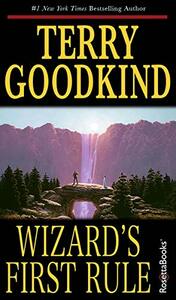You need to sign in or sign up before continuing.
Take a photo of a barcode or cover
He should've just left it at this one or made a trilogy. I got really sick of the arrogance and preachiness this series dwindled into.
If I saw a benefit in it for me, or thought I might say something that would benefit future readers of WIZARD'S FIRST RULE, I'd take the plunge and write an essay-length review of this book. I certainly have a plethora of thoughts about it, but I'd rather deliver a few summary remarks, because this book did really capture me.
I got hooked immediately. The tension in the first scene, the unanswered questions won me. The world-building was efficient, grounding, and enjoyable. I quickly started noticing world-view seeping from the characters--meaning, I felt the author's world-view leaking into the dialogue. Usually, that kind of scenario turns me away, but I was intrigued by the way what usually feels like propaganda actually worked in this book.
At about the quarter point, I researched Goodkind and discovered some of his influences, which didn't surprise me, but I continued reading the novel with pleasure. I was especially enraptured by the long torture scene near the end of the book.
I forgave dozens of errors of convenience, and even glanced past some of the frustrating introduce-a-side-character-to-kill-him-so-someone-dies-but-not-a-main-character conveniences Goodkind created: see Brophy, and I was prepared to rate this book most highly despite knowing some of the people I enjoy corresponding with would judge me for liking the work of a Ayn Rand disciple. Is that a kind of spoiler?
Anyway, the ending did stain the book for me, enough to pull back a bit. In the history of pretty bows, and neat, tidy resolutions, this book assumed the position of prominence in what I've read. Every major and minor conflict was addressed. No questions were left unanswered, yet room for a sequel was spared. I had a tough time with the sentimentality at the end, and I have an even harder time with the sentimentality because if any two characters earned the right to love each other more passionately than life itself, Kahlan and Richard earned it, so why did their dialogue of devotion still come across syrupy?
Nonetheless, I loved this book. It made me feel; it caused me to question my views on kindness, compassion, justice, good and evil, and more. Any book that can wear its propaganda so shamelessly, and still deliver such impactful insight while pulling me along with great tension and plot is a book I'll recommend. I'd recommend this to anyone who's willing to read something whether it fits into their political, ethical, social framework or not.
I got hooked immediately. The tension in the first scene, the unanswered questions won me. The world-building was efficient, grounding, and enjoyable. I quickly started noticing world-view seeping from the characters--meaning, I felt the author's world-view leaking into the dialogue. Usually, that kind of scenario turns me away, but I was intrigued by the way what usually feels like propaganda actually worked in this book.
At about the quarter point, I researched Goodkind and discovered some of his influences, which didn't surprise me, but I continued reading the novel with pleasure. I was especially enraptured by the long torture scene near the end of the book.
I forgave dozens of errors of convenience, and even glanced past some of the frustrating introduce-a-side-character-to-kill-him-so-someone-dies-but-not-a-main-character conveniences Goodkind created: see Brophy, and I was prepared to rate this book most highly despite knowing some of the people I enjoy corresponding with would judge me for liking the work of a Ayn Rand disciple. Is that a kind of spoiler?
Anyway, the ending did stain the book for me, enough to pull back a bit. In the history of pretty bows, and neat, tidy resolutions, this book assumed the position of prominence in what I've read. Every major and minor conflict was addressed. No questions were left unanswered, yet room for a sequel was spared. I had a tough time with the sentimentality at the end, and I have an even harder time with the sentimentality because if any two characters earned the right to love each other more passionately than life itself, Kahlan and Richard earned it, so why did their dialogue of devotion still come across syrupy?
Nonetheless, I loved this book. It made me feel; it caused me to question my views on kindness, compassion, justice, good and evil, and more. Any book that can wear its propaganda so shamelessly, and still deliver such impactful insight while pulling me along with great tension and plot is a book I'll recommend. I'd recommend this to anyone who's willing to read something whether it fits into their political, ethical, social framework or not.
Lots of common fantasy tropes, but still stands well. The ending of book one was so good that I kind of want to stop reading the series so that the poor characters can rest though. :)
This book was phenomenal. A great cast of characters, in a landscape that Terry Goodkind vividly paints with passionate detail, and an ending that left me wondering how he tricked me so easily... Wizard's First Rule, I suppose. :)
One of the best I've read in awhile, actually. I can't wait to get started on Stone of Tears!
One of the best I've read in awhile, actually. I can't wait to get started on Stone of Tears!
What an amazing start to a fantasy series. Can't wait to read the rest.
adventurous
dark
emotional
slow-paced
Plot or Character Driven:
A mix
Strong character development:
Yes
Loveable characters:
Complicated
Diverse cast of characters:
No
Flaws of characters a main focus:
Complicated
slow-paced
Plot or Character Driven:
A mix
Strong character development:
Complicated
Loveable characters:
No
Diverse cast of characters:
No
Flaws of characters a main focus:
Complicated
This entire book was so meh. I wouldn't've finished it if a good friend didn't recommend it and say it was their favorite fantasy series.
Maybe if I had read it when I was young I would've liked it.. Supposedly the series gets better after this, but it was already so much self-indulgent boy garbage with the main character being a total Mary Sue to give it more of a chance. Goodkind should've just leaned all the way into writing fantasy erotica.
Maybe if I had read it when I was young I would've liked it.. Supposedly the series gets better after this, but it was already so much self-indulgent boy garbage with the main character being a total Mary Sue to give it more of a chance. Goodkind should've just leaned all the way into writing fantasy erotica.
Book Nerd Your Way Challenge 2022
I love this series. I read this book it seems like a very long time ago. This time I listened to it on Audio and I really enjoyed the Narrator. The same parts made me emotional, the same parts made me angry, and the same parts suprised me... even though I kind of remembered them. It was the way the narrator I think brought it to life.
I love this series. I read this book it seems like a very long time ago. This time I listened to it on Audio and I really enjoyed the Narrator. The same parts made me emotional, the same parts made me angry, and the same parts suprised me... even though I kind of remembered them. It was the way the narrator I think brought it to life.
A thoroughly by-the-numbers fantasy epic of good vs. supreme evil that is much too padded and contains villains that are too one-dimensional in their wicked ways.
“People are stupid. They will believe a lie because they want to believe it's true, or because they are afraid it might be true.”
You know how sometimes you read a book as a kid/teenager, and at the time you thought it was the most amazing book in the world, and then you read it again as an adult and think "Well, that's garbage"? I fully expected to ruin the fond, nostalgic thoughts I had for this book. Instead, it still holds up decently well, although there were quite a few things I had forgotten in the 10 or so years since I've read it. I'm going to get mildly into some spoilers below.
What the hell was up with the whole BDSM/hate-fucking/torture porn portion? I DO NOT remember that from the several times I read it as a teen, and it seems like that would have been one of the things that would have stuck in my impressionable young mind. Also, the rampant pedophilia that was so casually tossed in there was disgusting. Some of the characters were so forgettable that, during my re-read, they would pop up in a chapter and I would go "who?"
Overall, though, I still would have enjoyed this book as an adult, even if I had never obsessed over it as a teen. I think that it's a good representation of the fantasy genre, even if the author insists that it's not fantasy. There's dragons, magic, wizards, and monsters. It's a fantasy book. Sorry, Terry Goodkind. That's just how these things work.
You know how sometimes you read a book as a kid/teenager, and at the time you thought it was the most amazing book in the world, and then you read it again as an adult and think "Well, that's garbage"? I fully expected to ruin the fond, nostalgic thoughts I had for this book. Instead, it still holds up decently well, although there were quite a few things I had forgotten in the 10 or so years since I've read it. I'm going to get mildly into some spoilers below.
What the hell was up with the whole BDSM/hate-fucking/torture porn portion? I DO NOT remember that from the several times I read it as a teen, and it seems like that would have been one of the things that would have stuck in my impressionable young mind. Also, the rampant pedophilia that was so casually tossed in there was disgusting. Some of the characters were so forgettable that, during my re-read, they would pop up in a chapter and I would go "who?"
Overall, though, I still would have enjoyed this book as an adult, even if I had never obsessed over it as a teen. I think that it's a good representation of the fantasy genre, even if the author insists that it's not fantasy. There's dragons, magic, wizards, and monsters. It's a fantasy book. Sorry, Terry Goodkind. That's just how these things work.




